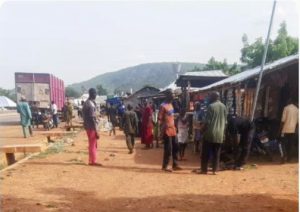


Scene at the event captured by our correspondent.
By Our Correspondent in Jebba.
At the heart of Nigeria’s struggle with corruption lies the quiet resistance of ordinary citizens,men and women who dare to ask questions.
On Thursday, that resistance turned bloody for Ganiyu, a humble truck driver, whose only crime was challenging a demand for an unexplained payment by uniformed officers at the Jebba Tollgate in Niger State.
Returning from a Sallah shopping trip in one of the northern states, Ganiyu and his team were headed to Lagos with a truckload of livestock,cattle, rams, and goats.
Like many other Nigerians engaging in inter-state trade, they expected the usual road checks. But what unfolded at Jebba was beyond the ordinary.
Our correspondent who witnessed the scenario reports that Ganiyu’s truck was intercepted by a combined team of police officers and Nigeria Agricultural Quarantine Services (NAQS) personnel.
In the name of “routine checks,” they demanded he pull over. He complied. Then came the request for an undisclosed sum of money. He asked, “Why?”
It was a question that struck the wrong chord.
“I saw other trailers waved through after mere greetings. Why must I pay?” he asked. In those words, Ganiyu questioned not only his treatment, but a deeper culture of selective extortion and unchecked power.
Rather than provide answers, the officers responded with brute force.
Passersby watched in horror as uniformed men rained blows on the middle-aged driver.
His body hit the dusty roadside twice. His lips bloodied, his shirt torn, his voice hoarse, but unbroken. Around him, petty traders and commuters began to raise their voices in protest. “Why him?” they asked. “Why demand money without accountability?”
In a system where silence is often bought or beaten, Ganiyu’s resistance was rare. His refusal to pay, a stand against what many drivers call “a road tax with no receipt” was met with violence, intimidation, and finally, detention.
The incident at Jebba is not isolated. It’s part of a growing pattern across Nigeria’s highways where uniformed men operate unmonitored, exploiting the grey lines between duty and abuse. While some commuters pay to avoid trouble, others, like Ganiyu, choose dignity over silence.
But the day also offered a glimmer of hope. The crowd that gathered,market women, transporters, bystanders,stood with Ganiyu.
They shouted, they questioned, and their presence may have saved his life. It was a moment of collective conscience in a society that often looks away.
Ganiyu’s story deserves more than sympathy. It demands accountability for those who wear uniforms and wield power.
His voice, hoarse but courageous, reminds us all that asking questions should never be a crime.
Edited by Dada Ahmed.


